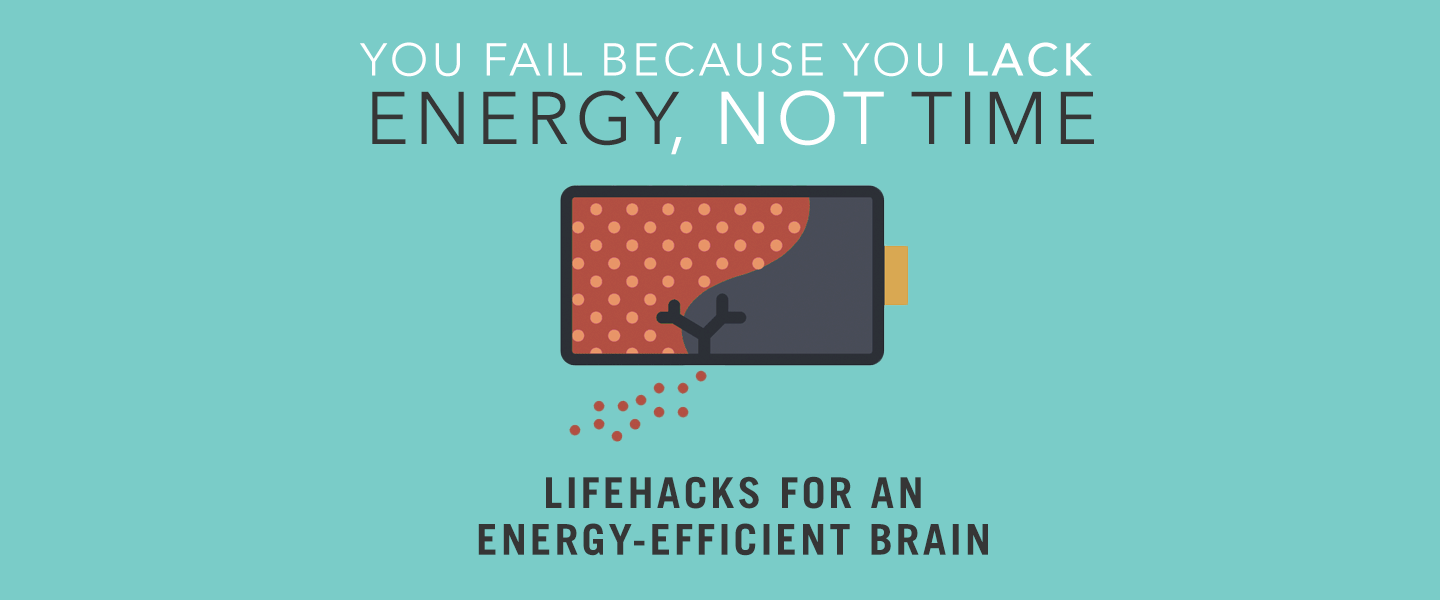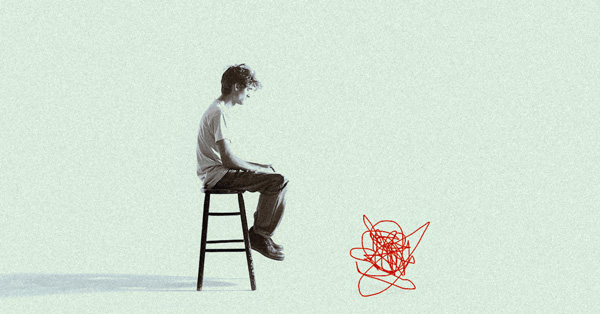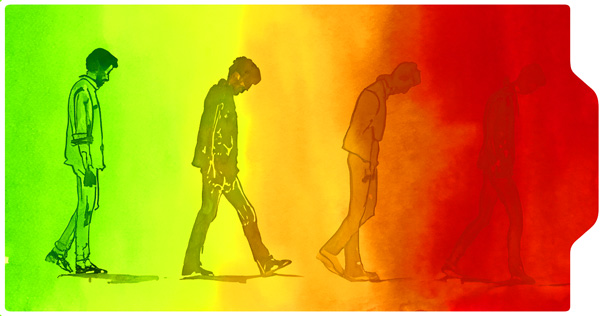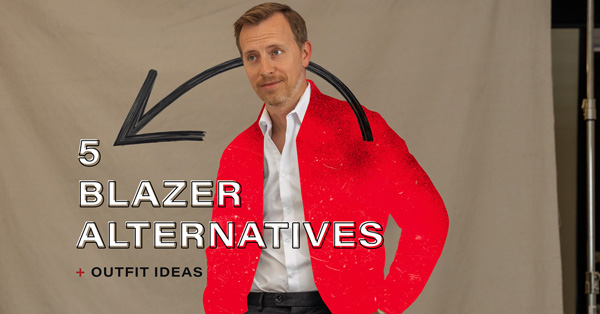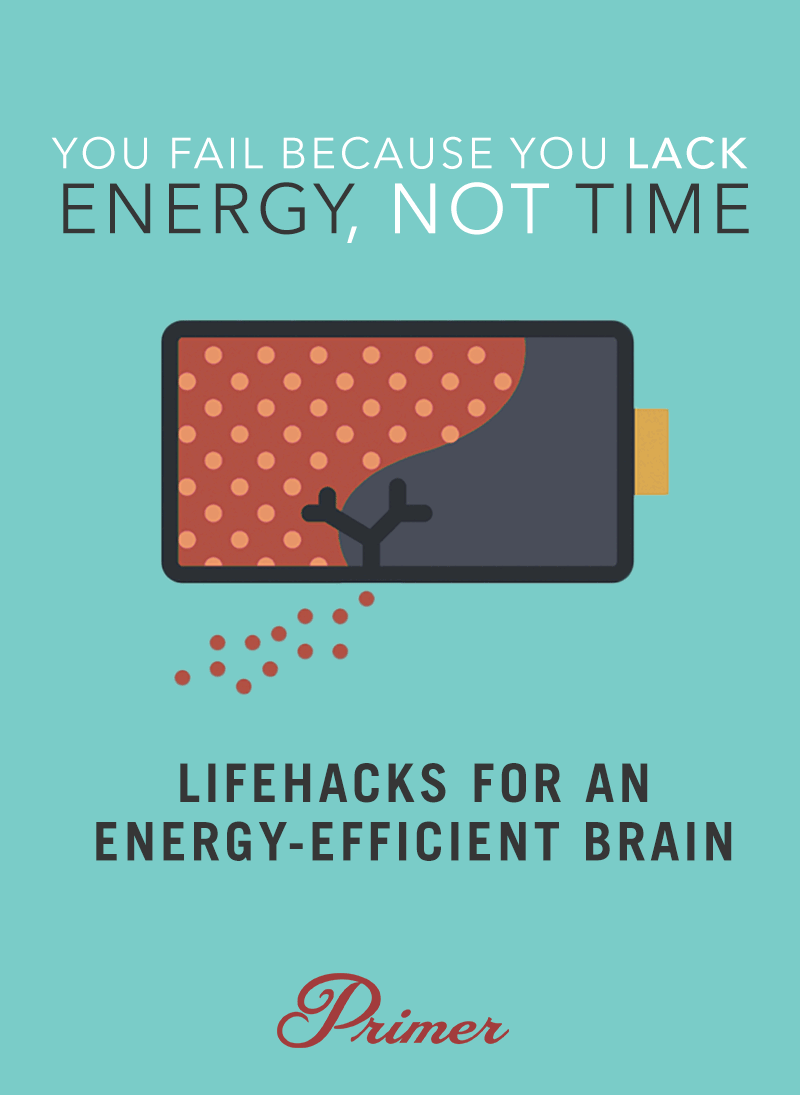
We spend a lot of energy trying to save time, but in reality, we should be doing it the other way around: spending time trying to boost our energy.
The reason? Time is worthless without energy.
And that’s the problem with trying to save the world by brushing your teeth in the shower or thawing butter with a cheese grater. We often say that we’d do more if there was more time in the day or another day of the week. But I know exactly what we do whenever we get an extra hour of time. It happens once a year when daylight saving time ends: we sleep for another hour.
That, among other evidence, says to me that energy is a more precious resource than time.
So why are we wasting so much energy trying to manage our time?
For one, it’s more immediately rewarding to save time because it’s quantifiable. You can say, “Ah, I saved 15 minutes by canceling a meeting so I could go home and presoak soma pasta.” But if we are looking further down the road toward our big life goals, saving a few minutes here and there pales in significance compared to the productivity boost you’d get from a bigger pool of energy.
Let’s stay with that road metaphor. And let's assume that your car is in good repair (i.e. you are physically fit and eating right).
If life is a highway, then you ride it to get from point A to point B.
Point A is where you are right now. Point B is your big, ambitious goal. Your destination.
You have one, right? If you don’t, then it’s high time you get one. For the purposes of this article, just choose something. Choose whatever you want. Make it meaningful and make it big.
- Write the Great American Novel.
- Get six pack abs.
- Build the world’s shiniest breakdancing robot.
Got a goal? Good. I’m glad. I knew you’d pick the breakdancing robot one.
Having a big, meaningful goal helps us because it presents us with a more clearly defined problem.
For us, it is this:
“God has called upon me to drive from New York (Point A) to Albuquerque (world’s shiniest breakdancing robot), but I’ve only got 70 gallons of gas.”
Of course, no journey is as simple as going from point A to point B. You’re building the world’s shiniest breakdancing robot, but you also have to work your full-time job, volunteer at the firestation, and care for your geriatric ferret. So, your road trip just got a lot longer and you still have the same amount of gas.
Put that way, we have ourselves a good old-fashioned energy crisis. We have a finite resource—energy—and a few non-negotiable big rocks in your mayonnaise jar.
The most immediate way to have more energy is to use less. So, how do we increase the fuel efficiency of your metaphorical car?
Stop switching gears and start cruising
One of the biggest taxes on our emotional and physical energy is multitasking. The reason for this is simple: multitasking is a myth.
As Matthew MacKinnon MD pointed out in a Psychology Today column:
“Science has consistently shown that the human brain can only sustain attention on one item at a time… Our overestimation of our attentional capacity stems from a fundamental misunderstanding of the concept of multitasking and of the human attentional system as a whole.”
Rather than simultaneously paying attention to two (or more things), what we actually do is rapidly switch from one train of thought to the next. Similar to the speed you lose when you shift a car transmission, there’s a cost associated with switching your attention. Studies show that so-called multitasking actually makes us less productive.
Along those lines, a steady pace on an unbending path is the smoothest, most energy-efficient way to go.
EPA studies show that there are two very fuel inefficient driving behaviors: aggressive driving and idling. With aggressive driving, you burn an immense amount of fuel accelerating quickly, only to slam on the brakes a short time later. With idling, you’re burning gas, but you’re not going anywhere (more on this later).
It’s the same with your personal energy. Too often, we allow ourselves to fall into an aggressive driving mode. If you operate in crisis mode, constantly putting out fires, getting 90% of the work done in the last 10% of the time allotted, then you’re driving aggressively. You are driving the same amount of miles, but you are burning more fuel.
It is far better and safer to get to a comfortable speed and hit the cruise control. That may seem easier said than done. But now that you’re thinking about energy, instead of time, you can make this your goal. Sure, you got something in before the deadline, but at what energy cost?
Reaching a destination at a comfortable pace requires some planning ahead, so start focusing on it now. Instead of planning on flooring it to make it across the finish line at the last second, pick your pace and then see if you can negotiate moving your deadline. If it’s a self-imposed deadline, that’s an easy one. If it’s not, then start earlier at a steady pace. You’ll reach your destination with much more fuel left in the tank. And remember: when you drive aggressively, you run the very real risk that you’ll never make it at all, because you’ll crash and die. A steady pace presents less risk, and if the deadline can move to accommodate it, that’s a good thing.
Unload the baggage
Your car is a terrible place to store things. There’s no reason to lug around a set of golf clubs and an old dresser and a box of binders from high school projects in the trunk. I’m not saying to trash these things—they are your important possessions and they serve some purpose. But you should be storing them in a way that makes them retrievable when you need them, but stops them from being burdensome when you don’t.
The unnecessary junk in the trunk is all the mental and emotional stuff that’s important to you, but not right now.
This is a huge waste of energy when the reminders pop in at times when you can’t do anything about them. You’re switching gears to idle right in the middle of a race. You’re about to kick a field goal, and your brain’s like, “Hey, did you cancel your free Spotify trial yet?” Or you’re about to ask a girl out and your brain is like, “Your dad never loved you.”
The best way to address this is this:
Give yourself permission to only worry about one thing at a time.
Achieving this can be as simple as designating a time or space to deal with your baggage. Oftentimes, irrelevant and nagging thoughts or anxieties bubble up because you know on some level that it’s an open loop. It’s a subconscious CHECK ENGINE LIGHT, saying: “Yo, this needs resolved!” and you’re like, “Remind me again later,” and then your subconscious is like, “Oh I will. I will.”
When that happens, you need to have a better answer than “Remind me again later.” You need to be able to say, “Don’t worry, it’s on my calendar,” or “Remind me on Tuesday at 2PM when I’m at my therapist’s.”
This is a major undertaking, of course. But awareness is a huge step forward. Take stock of your mental and emotional multitasking and put together a plan to address it. These little interruptions are why it can feel like you’ve just climbed a mental mountain, even though you hardly did anything in the day.
Don’t view baggage management as a detour from your goals. You have to take care of it, or your mind won’t be clear when you need it.
Bucketing Your Anxieties
Jim Benson wrote an interesting blog post on the topic of Personal Kanban, a system for taming your workload and making it “cognitively manageable.” In his post, Benson defined the term existential overhead as “the cost in distraction and stress of uncompleted tasks.” He writes:
When your backlog is an amorphous bunch of tasks, all things are psychically equal. Cleaning the cat box and saving for retirement and getting married all have the same weight. The lack of definition is like waiting for news from someone and they don't call, people start to fill in the blanks with their fears.
Your brain not only thinks about this undifferentiated backlog, it hates it. It wants it to go away. Hate is heavy and negative.
There are many systems for wrangling your “undifferentiated backlog,” from Personal Kanban and Getting Things Done to the FranklinCovey planning system or Paul Ford’s AnxietyBox. Which one you choose doesn’t matter so much as the decision to choose a system. The goal is to create order of your bucket of nagging undones so that your brain stops spamming you with shame.
But wait, you start to write in the comments section. You just recommended time management systems in an article that allegedly eschews time management for energy boosting.
Very astute my friend. But I think I’d argue that systems like Getting Things Done and Kanban are actually energy management tools. Because actually doing things on your list isn’t really the point. The relief you’ll get is from capturing and assessing each item and negotiating a completion schedule that satisfies both reality and your guilty subconscious. This is true even if sometimes the target completion day is “someday” or “never.”
The point is consciously choosing what you’re going to focus your energy on. Once you do this in a meaningful way, the nagging feeling that you should be doing something else will subside.
Choose a default route before you start driving
When you drive from point A to point B, you usually map your route before you start driving your car. Imagine if you didn’t. You’d stop at every intersection and pull up the map. You’d be scrolling through your phone at every exit. Best case scenario, you take a few wrong turns and have to backtrack. Worst case scenario, you crash your car and die because you’re distracted while driving.
But for some reason, we don’t plan our days, our weeks, or our lives like this. In this way, we place a million unnecessary decisions throughout our day. And that’s a huge drain on our mental energy.
Do your future self a favor and make most of your decisions ahead of time. This is to avoid decision fatigue. It turns out that we have a finite store of mental energy for self-control and making decisions. And every little decision you make in a day—when to wake up, what to wear, what route to take to work, what phone to buy, which pill to take, which fatted calf to sacrifice—depletes your decision-making capacity. This means that at a certain point, you start defaulting. In the New York Times article I linked, it says this:
The more choices you make throughout the day, the harder each one becomes for your brain, and eventually it looks for shortcuts, usually in either of two very different ways. One shortcut is to become reckless: to act impulsively instead of expending the energy to first think through the consequences. … The other shortcut is the ultimate energy saver: do nothing. Instead of agonizing over decisions, avoid any choice. Ducking a decision often creates bigger problems in the long run, but for the moment, it eases the mental strain.
There’s a way you can exploit this. Make the obviously better choices ahead of time. Schedule appointments to workout with a friend throughout the week. Plan healthy meals for each day of the week. That way, when dinner or lunch comes creeping around, you don’t have to listen to what your heart and soul want, you just get tacos because it’s Tuesday and nobody objects.
Do this for as many mundane things as you can. When it comes to decision fatigue, any decision will run you ragged and will actually deplete your willpower, making it harder for you to make wise choices as the day goes on.
“Big decisions, small decisions, they all add up. Choosing what to have for breakfast, where to go on vacation, whom to hire, how much to spend — these all deplete willpower, and there’s no telltale symptom of when that willpower is low,” according to The New York Times piece. “Ego depletion manifests itself not as one feeling but rather as a propensity to experience everything more intensely. When the brain’s regulatory powers weaken, frustrations seem more irritating than usual. Impulses to eat, drink, spend and say stupid things feel more powerful (and alcohol causes self-control to decline further).”
So, do yourself a favor, and put as much of your life on autopilot as you can.
This may feel limiting. But don’t look at it that way. You are just as free to impulsively change your default choices as you are to leap up from your desk chair right now and run naked into the forest and leave this cubicle bullshit behind. There’s nothing stopping you from changing these default plans if something better comes up. But there’s a good chance that you’ll keep them as the default, rather than expending the mental energy of changing course. If you’ve made a positive choice as your default, then making a non-decision later will be a good thing.
Or better yet, you can save your strength for the truly important decisions like which job to take, which house should to buy (or rent?), or what kind of finish to put on your world’s shiniest breakdancing robot.
Can’t Decide What to Do?
Then Do The Thing You Least Want to Do
It’s the great conundrum of being overwhelmed: you have so much to do, you end up doing nothing. You end up gridlocked, unable to decide what thing deserves your time and attention. You start to do one thing, but then you start feeling guilty that you’re not doing the other thing, so you stop. If that’s your life, do this: just do whatever you want to do least.
Why? Because the thing you want to do the least is probably the most daunting, most important thing on your backlog. And getting it done will diffuse all that anxiety and dread hanging over your head. Even if it’s something you fear, and your fears come true, you’ll at least be on the other side of the Rubicon. And that’s the hardest part.
Fuel yourself with wins
On the road to your goal, you should be driving a hybrid car. When you drive a conventional vehicle, you burn gas, and it’s gone. You have to keep filling up the tank in order to go any further. Now, think of a hybrid car. You burn the fossil fuel to get going, but the regenerative brakes allow you to recapture that kinetic energy and charge your battery.
With personal energy, there is a figurative regenerative brake mechanism that will let you produce energy even as you use it. It’s called winning.
Whenever you achieve a goal, your brain gives you a shot of dopamine. You know, the feel-good stuff. You don’t need science to explain that you feel awesome when you score a touchdown or nail a job interview. And that feeling of awesomeness inspires you to go out and do it again.
But here’s the tricky thing about goals: they are a double-edged sword. When we meet them, we feel awesome. When we fail, we feel twice as bad.
As author and investor Monica Mehta points out in her article Why Our Brains Like Short-Term Goals, “setting the bar too high with goals can actually be counterproductive. Each time we fail, the brain is drained of dopamine making it not only hard to concentrate but also difficult to learn from what went wrong.”
So, here’s the trick. Don’t abandon your big, ambitious goal to make the world’s shiniest breakdancing robot. Keep that glorious groove machine on the horizon. But in the meantime, populate your days, weeks, and months, with smaller, more attainable goals. The important thing is to make it achievable. Move the goal within striking distance and slam dunk it every damn day.
Get out of bed and say “my goal for today is to polish my robot’s big toe for 20 minutes.” Or say that by the end of the quarter, you’ll teach your robot to do the worm. Or say that your goal is to simply work on your robot at all for 1 hour a day minimum, regardless of progress. Set those goals and achieve them.
It might feel stupid and pointless to set the bar so low for yourself. But it works. “Collecting wins, no matter how small, can chemically wire you to move mountains by causing a repeated release of dopamine,” Mehta writes. “When dopamine flows into the brain's reward pathway (the part responsible for pleasure, learning and motivation), we not only feel greater concentration but are inspired to re-experience the activity that caused the chemical release in the first place.”
That is, you form a habit of being successful and productive. And the beautiful thing about habits is that they sip fuel instead of guzzling it. In some cases, they even give you energy. You become addicted to success. And as long as you’ve picked a healthy goal, that’s a good thing.
The rule is this: do things that give you a sense of accomplishment. This applies even when you’re not working on your robot. Choose small tasks that give you a sense of control, like tidying up your workspace or knocking out a few 2-minute tasks on your to-do list. Do this even when you are extremely exhausted and are ready to crash. Take 10 minutes to do something that will feel like a win, and then reassess whether or not you want to cash out for the night. Chances are, you’ll find yourself magically energized. And it just gets better from there.
Refill Your Cup by Relaxing with Purpose
This is an important point, but I couldn’t torture the car metaphor any longer.
Most of this article has dealt with how you operate when you’re getting things done. But it’s just as important to relax the right way. Recharging your battery through R&R is a fairly counterintuitive pursuit. When you are worn out and tired, it seems like turning your brain off or hitting the sack are exactly what you need to replenish your energy meter. But frustratingly, it doesn’t always work out that way. Sometimes, you might emerge from your downtime still feeling unrested. Or you might even feel more exhausted.
First, you have to make sure you’re fully relaxing, and not multitasking idle processes, as I mentioned above.
The next step is to develop a way to perform a graceful shutdown. This is the technical term for hitting the “Shut Down” button on your computer instead of pulling the plug.
There are processes that occur during a graceful shutdown that help ensure that all the progress of the day isn’t lost. There’s a filing away of successes and frustrations, an accounting of resources, and a winding down of background processes. Failure to perform a graceful shutdown can cause damage to your system. And just like you should never pull the plug on your computer when it’s processing or rip a USB drive out while you are writing to it, you shouldn’t just slam the door on your productive life because it’s Friday and it’s 5 o’clock. There are precious resources in your worn-out brain that need to be recaptured and winding down with purpose lets you do that.
Fortunately, my esteemed colleague Gordon Brown has already written an excellent piece on How to Relax with Purpose. In it, he says:
Relaxation (not leisure, but relaxation) is the conscious and strategic steps we take to prepare ourselves for stress. Relaxation isn’t about distracting yourself with some new thrill, it’s about releasing stress, irritation, doubts, and anger.
The issue is that many of our modern day non-work-related pursuits are distractions, rather than bona fide relaxation. When you put a screen in front of your face—a Facebook news feed or a Reddit front page or an edge-of-your-seat serial drama on Netflix—you’re not processing your stress, you’re distracting yourself from it. If your stress and exhaustion are a crying baby, you’re doing the equivalent of turning up the radio to drown it out, rather than soothing the baby so it stops crying. The problem with that: as soon as the radio turns off, that baby is still there, and probably even more pissed off that you actively ignored it for so long.
That is how you can be idle, yet reclaim zero energy from the day. So, read the rest of Gordon’s article on How to Relax with Purpose and come back refreshed.
Conclusion
The takeaway is this: you’ll get more mileage out of saving energy than you will on micromanaging your time.
I think that you’ll find that once you solve the energy problem, the time problem will take care of itself. This happened to me this year when I started putting all these principles into action toward a big, big goal. I’m making progress and I feel energized. Other than waking up slightly earlier than usual, I can’t tell you where the time to do more has come from. And it doesn’t really matter. When you have the intention, the energy, and the motivation, you will naturally use your available time—whether it’s a spare hour before work or a long lunch break or an extended midnight oil session—and work toward something that fulfills you.
Try it out. And be sure to leave me photos of your shiny, breakdancing robot in the comments.



